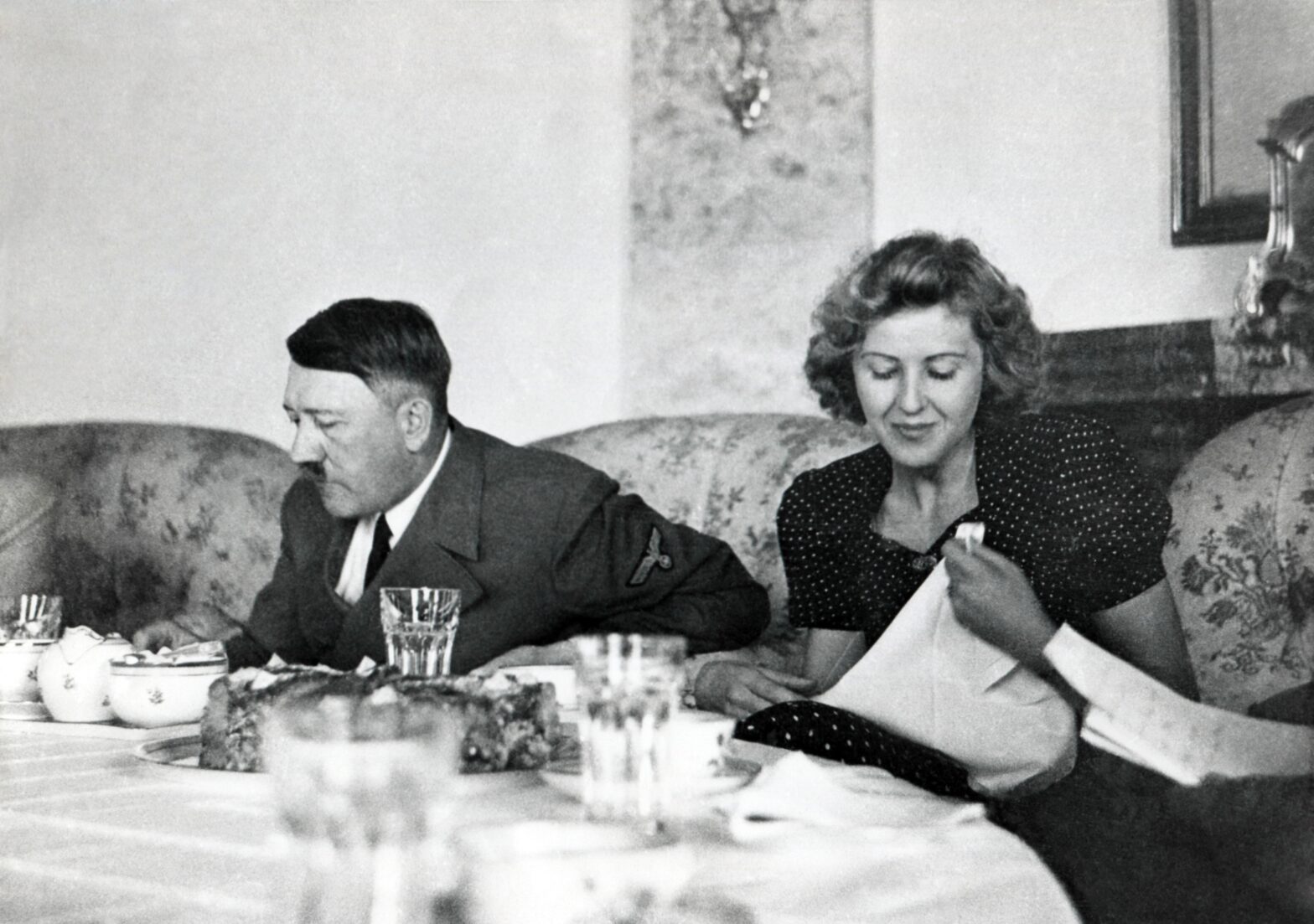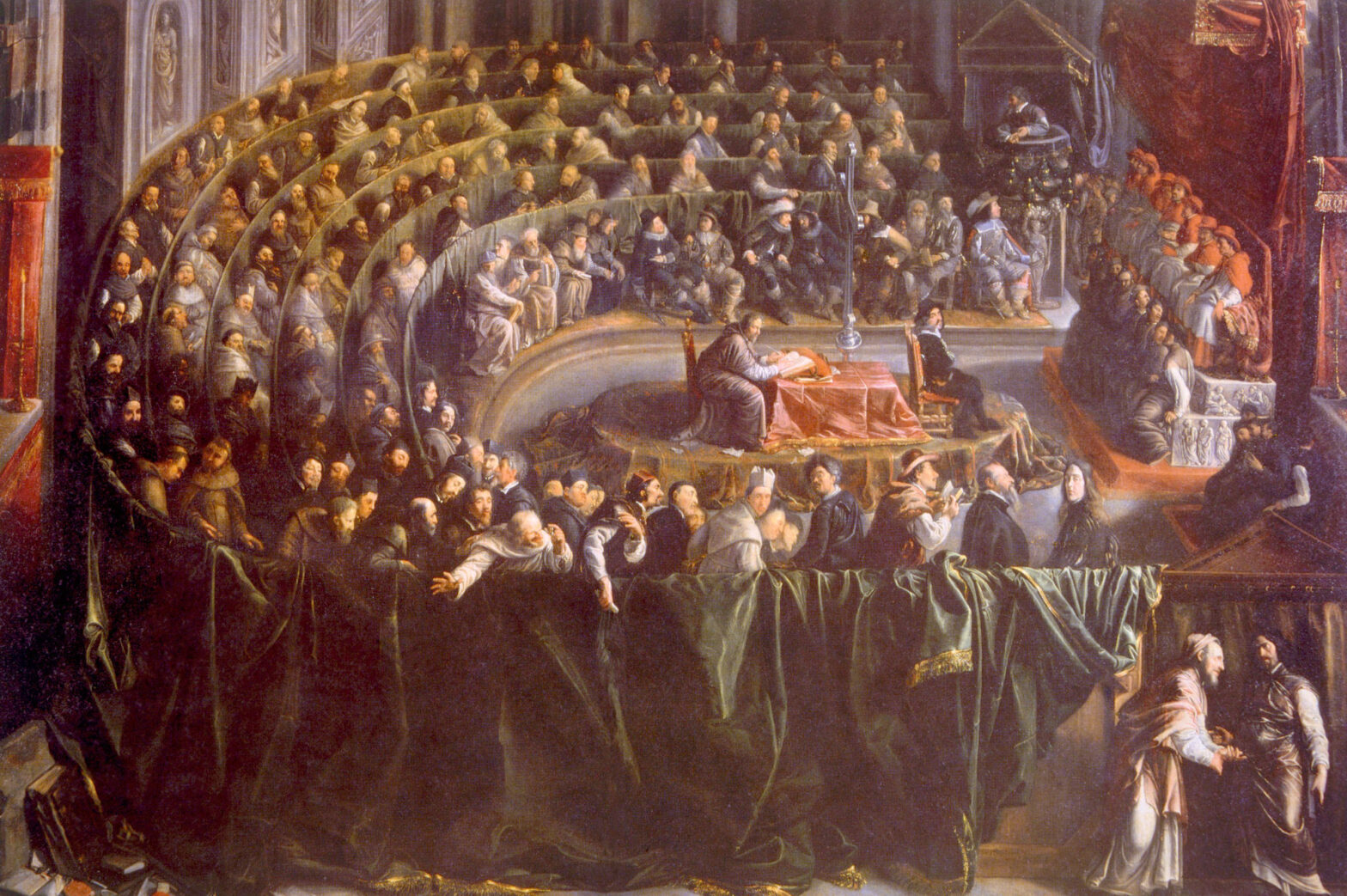A tape recording of Hitler’s last minute marriage proposal to Eva Braun has been discovered in the ruins of the old Reich Chancellery Bunker in Berlin where they were married and shortly afterward committed suicide in April of 1945. Dangerous Neighbors is proud to present an English translation of the transcript for the very first time. As the transcripts begins, EVA is sitting in their bunker bedroom, listening to polka music on the radio.
RADIO ANNOUNCER: Good morning, Berlin! That was “The “Ubermensch Polka” by the delightful Steitz Sisters. Well, traffic is anything but delightful this morning as Russian tanks are blocking the autobahn. You may want to find alternate routes to work this morning….but don’t worry, Final Victory is just around the corner! And now we resume our musical program with “Polka Pandemonium” by, ja, the Schmidt Twins!
A vivacious polka starts up. Loud bombs blasts outside the bunker. ADOLPH HITLER stumbles into the bedroom.
ADOLPH: Eva, there is something I’ve been meaning to ask you.
EVA: Ja?
ADOLPH: It’s just that…well, we’ve grown so close these past few months.
EVA: That’s because we’ve been trapped like rats in this lousy bunker since January.
ADOLPH: I tried to make it nice for you, Eva.
EVA: Ja, a couple of rhinemaiden statuettes and a few doilies with swastikas and you think we’re at the Kaiserhof.
ADOLPH: Liebchen, I know these last few months haven’t exactly been a lotta laughs.
EVA: Oh, but the chill, dank, paranoid monotony of it all is only just beginning to grow on me.
ADOLPH: Like I said, we’ve grown very close these past few months.
EVA: We did this one already.
ADOLPH: And it’s come to my attention that you’re a very special girl.
EVA: What do you mean?
ADOLPH: What?
EVA: How am I special?
ADOLPH: Well, uh…you know, uh…
EVA: Ja?
ADOLPH: You’ve got a certain…
EVA: Ja?
ADOLPH: I don’t know…flair.
EVA: Flair?
ADOLPH: Ja.
EVA: You want a girl to love you, you tell her she’s got “flair”?
ADOLPH: Well, what would you call it?
EVA: You’re supposed to tell me.
ADOLPH: I’m fighting a war with phantom legions for God’s sake! My stomach is tied in knots. You can’t expect me to come up with poetry on the spot.
EVA: If you really loved me–
ADOLPH: Don’t give me that. A lot of girls would love to be in the Fuhrer’s bunker, believe me. Berlin’s in flames, Baby. You could do a lot worse!
EVA: Well, maybe Berlin wouldn’t be in flames if you hadn’t opened up that goddamned second front.
ADOLPH: Oh, no, we are not having this conversation again.
EVA: What did I tell you, Adolph? Bring the Allies to their knees first, then crush the Russians, but nooo–
ADOLPH: All right, so I had a little too much schnapps that day.
EVA: But, no, I’m the Fuhrer! A genius, don’t you know? Look how everyone gives me the stiff arm salute!
ADOLPH: I really must insist you stop this, Eva.
EVA: And now look at us. Living like moles in this godforsaken hole…playing Yahtzee with the S.S. every night. Listening to you and Goebbels reminisce about the salad days of the Nazi Party. I should have married Horst Schtenkel when I had the chance.
ADOLPH: The sausage vendor?
EVA: Laugh if you like, but Horst had style.
ADOLPH: Damnit, Eva, I’m the Fuhrer!
EVA: Well, if you think I’m going to marry you just because you’re the almighty Fuhrer, you can forget it!
ADOLPH: Who said anything about marriage?
EVA: Isn’t that what you were leading up to here?
ADOLPH: Well, uh…actually, yes.
EVA: Oh, my heart is singing. Out of all the girls in the bunker, you want to marry me.
ADOLPH (going down on one knee) Eva Braun, will you marry me?
There is a tremendous explosion, throwing them both to the floor.
EVA: We’re not getting any younger, are we?
ADOLPH: What do you say, pussycat? Goebbels has promised to play the spoons at our reception.
There is another, even louder blast, shaking the bunker.
EVA: Oh, my God! Are we going to die?
ADOLPH: Well, I wouldn’t bother renewing my book club membership.
EVA: I don’t want to die! I still fit into my high school gym clothes.
ADOLPH: Eva, we must face up to our fate with courage.
EVA: Our fate? This is all your fault. I should have known you were trouble the minute I laid eyes on you and your beer-swilling, brown-shirted buddies.
ADOLPH: We were meant to be together forever, Eva!
EVA: Oh, yeah? Then why didn’t you ask me to marry you until we were entombed down here?…No snappy comeback for that one, eh?
ADOLPH: You know, I’ve always had difficulty making commitments. You see my father–
Just then, JOSEPH GOEBBELS, Reich Propaganda Minister, enters the bedroom.
EVA (rising) Oh, go to Hell!
ADOLPH: (rising) Goebbels! What are you doing here?
GOEBBELS: Forgive the intrusion, mein Fuhrer, but there is a forty reichsmark deposit for the bunker reception hall, and…I was a little short.
EVA: Nobody’s getting married.
ADOLPH: (pulling cash out of his wallet) Your timing is deadly as usual, Goebbels.
GOEBBELS: Forgive me, mein–
ADOLPH: (handing cash to him) Does forty reichsmarks include the use of the bubble machine?
GOEBBELS: Ja, and for another ten, the Schmidt Twins will play all your favorite polkas and marches.
ADOLPH: If I see either one of the Schmidt Twins anywhere near the bunker, they’ll both be shot! Is that clear?
EVA: Adolph!
GOEBBELS: Yes, mein Fuhrer!
ADOLPH: Okay, now I want everything done first class. The ice sculpture will be at the center of the buffet table, which must be double-sided. I want black skirting around the edges and red and white fluff along the top. We’ll have black napkins tied in little bows arranged around the knockwurst platter and two additional rows of–
EVA: Nobody’s getting married!
GOEBBELS: Oh, you kids will work this out.
EVA: Shut-up, you creep!
GOEBBELS dashes for the door.
ADOPLH: Goebbels!
GOEBBELS: (stopping in his tracks) Yes, mein Fuhrer?
ADOLPH: Don’t forget the little Panzers from the war room. They must be–
GOEBBELS: Placed strategically in a ring around the champagne fountain!
ADOLPH: Excellent!
GOEBBELS: Mein Fuhrer, I did have to borrow champagne glasses from the Luftwaffe so they do have little wings on them, but–
EVA: Nobody’s getting married!
GOEBBELS: (saluting ADOLPH) Heil Hitler!
GOEBBELS turns and flees the room. A tense pause.
EVA: So, you made all the arrangements without even asking me?
ADOLPH: My horoscope said it was a good day to take big steps in my personal life.
EVA: Mine said to let go of negative attachments.
ADOLPH: Please, Eva, will you marry me?
There is another enormous explosion outside, rocking the bunker and throwing them closer together.
EVA: Do you really love me?
ADOLPH: I love you more than a night bombing of London.
EVA: Oh, Adolph.
ADOLPH: I love you more than a stroll past the Eiffel Tower on a June afternoon.
EVA: Oh, mein Fuhrer, I love you too.
ADOLPH: Then you’ll marry me?
EVA: Will you let the Schmidt Twins play at the reception?
ADOLPH: No, on that point, I will not budge.
EVA: Adolph!
ADOLPH: Oh, all right, but they will be shot immediately after the reception!
EVA: Oh, thank you, Honey Bear!
They embrace and kiss as passionately as the moment will allow.









